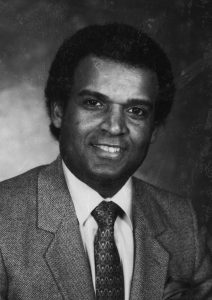
Photo info ...
(Feb. 21, 1938-Aug. 9, 2000). Walter Scott Blackburn was born on February 21, 1938, to Dr. (a minister and civic leader) and Fannie Scott Blackburn. He grew up in Indianapolis and attended Purdue University, where he studied engineering. Blackburn later transferred to Howard University’s School of Architecture. While at Howard, Blackburn met his wife and future business partner, Alpha Coles. The pair married on September 11, 1959, and later had three children.

After graduating in 1963, Blackburn and his family returned to Indianapolis. Blackburn set his sights on eventually opening his own architectural firm. After working several years for other firms, he was finally able to open his own firm in 1981—Blackburn Architects.
Blackburn was a gifted architect and quickly gained national prominence for his projects. He designed several of Indianapolis’s well-known structures including the , at , Grace Apostolic Church, and the expansion. Outside of Indianapolis, Blackburn designed several important structures such as Purdue University’s Black Cultural Center, the National Underground Railroad Freedom Center in Cincinnati, and the Malcolm X Institute at Wabash College in Crawfordsville.

Blackburn received numerous awards for his work. He was named a Fellow of the American Institute of Architects in 1990 and received the Edward Pierre Award from the Indiana chapter of the American Institute of Architects in 1998. Both of his alma maters presented Blackburn with honors, including an honorary doctorate from Purdue University’s School of Engineering and Technology and the Distinguished Alumni Award from Howard University. In 1993, Mayor Stephen Goldsmith recognized Blackburn’s contributions by proclaiming December 15, 1993, as Walter S. Blackburn Day.
In addition to Blackburn’s work, he also served as a member of the Board of the National Institute of Building Sciences, was an active member of the , and chaired the American Institute of Architects Diversity Taskforce (later being promoted to vice president). Blackburn also served as a visiting professor at Ball State University.
In 2004, the Walter Blackburn Scholarship Fund was established in memory of Blackburn’s legacy. The fund provides support to under-served and underprivileged youth.
FURTHER READING
- “Walter S. Blackburn and Blackburn Architects Architectural Records Collection.” Ball State University, 2016. https://archivessearch.bsu.edu/repositories/3/resources/5128.
CITE THIS ENTRY
APA:
Fischer, J. E. (2021). Walter S. Blackburn. Encyclopedia of Indianapolis. Retrieved Feb 20, 2026, from https://indyencyclopedia.org/walter-s-blackburn/.
MLA:
Fischer, Jessica Erin. “Walter S. Blackburn.” Encyclopedia of Indianapolis, 2021, https://indyencyclopedia.org/walter-s-blackburn/. Accessed 20 Feb 2026.
Chicago:
Fischer, Jessica Erin. “Walter S. Blackburn.” Encyclopedia of Indianapolis, 2021. Accessed Feb 20, 2026. https://indyencyclopedia.org/walter-s-blackburn/.

Help improve this entry
Contribute information, offer corrections, suggest images.
You can also recommend new entries related to this topic.